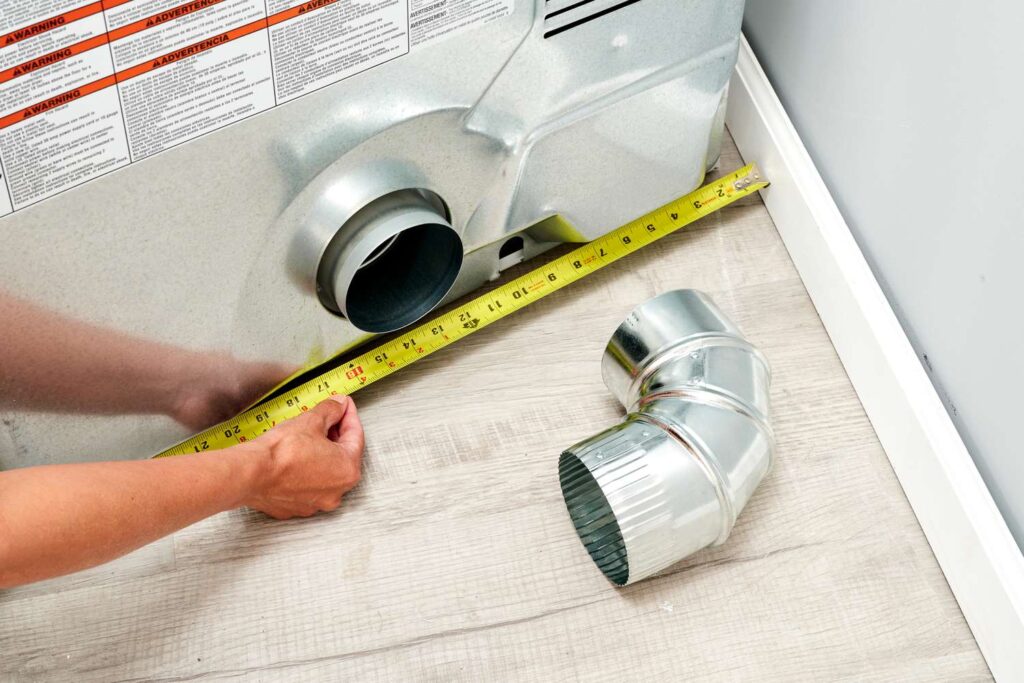When it comes to home safety and compliance in the Triangle area, understanding dryer vent code requirements is crucial for homeowners in Raleigh, Wake Forest, Cary, and Apex. Proper dryer vent installation and maintenance aren’t just recommendations—they’re legal obligations that protect your family and property. At DuctNClean, we provide professional dryer vent cleaning Raleigh residents trust while helping navigate these complex requirements and ensuring optimal dryer performance and safety.
1. Understanding North Carolina and Raleigh Dryer Vent Code Requirements
State-Level Building Codes in North Carolina
North Carolina follows the 2018 North Carolina Residential Code (NCRC) Chapter 15, Section M1502, which outlines comprehensive rules for dryer exhaust systems. This code applies to all residential properties including one- and two-family dwellings, townhouses, duplexes, and multi-family buildings throughout the state.
The North Carolina Building Code requires all dryer vents to be constructed of rigid or semi-rigid metal ducts with minimum 0.016-inch thickness. Flexible plastic or foil ducts are strictly prohibited in wall cavities and concealed spaces due to their increased fire risk and tendency to accumulate lint.
Key NCRC M1502 Requirements:
- Exhaust ducts must terminate outdoors (NCRC M1502.3)
- Maximum duct length is 35 feet, minus deductions for elbows (NCRC M1502.4.5.1)
- Rigid metal ducting minimum 0.016″ thick is required (NCRC M1502.4.1)
- Transition ducts are limited to 8 feet and must be UL-listed (NCRC M1502.4.3)
- No screens allowed at termination points (NCRC M1502.3.1)
Raleigh-Specific Dryer Vent Code Obligations
Raleigh enforces additional requirements beyond state minimums to address local climate conditions and urban density concerns. The city’s building department requires:
- Professional inspection of dryer vent installations during new construction
- Compliance with specific clearance requirements for multi-family dwellings
- Proper pest guard installation to prevent wildlife intrusion
- Regular maintenance documentation for commercial properties
Homeowners planning dryer vent modifications or new installations must obtain proper permits from the City of Raleigh Building Inspections Department. This ensures compliance with both local and state codes while protecting property values.
2. IRC Chapter 15: Exhaust Systems and Dryer Vent Specifications
Material Requirements Under Building Codes
The International Residential Code Chapter 15 establishes comprehensive standards for dryer exhaust systems. Section M1502 specifically addresses clothes dryer exhaust systems, requiring:
Approved Materials:
- Galvanized steel ducts with minimum 0.016-inch thickness
- Aluminum ducts meeting specific gauge requirements
- Stainless steel for coastal applications (relevant for eastern NC)
Prohibited Materials:
- Flexible plastic ducts (except for final connection)
- Sheet metal screws protruding into airstream
- Duct tape for sealing (foil tape required instead)
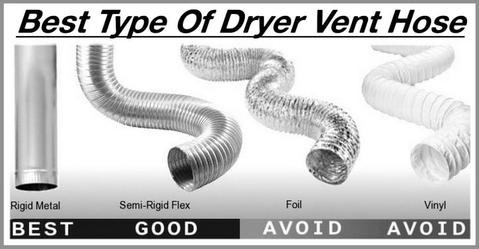
Duct Sizing and Length Restrictions
Proper duct sizing ensures efficient airflow and prevents lint accumulation. The NCRC mandates:
- Minimum 4-inch diameter for all dryer vents
- Maximum equivalent length of 35 feet from dryer to exterior (updated from IRC’s 25 feet)
- Length reductions for elbows: subtract 2.5 feet per 45-degree elbow, 5 feet per 90-degree elbow
- Smooth interior surfaces to minimize friction and lint buildup
For Raleigh homeowners with longer vent runs, dryer vent cleaning Raleigh professionals become even more critical to maintain code compliance and safety. Regular maintenance ensures optimal airflow and prevents dangerous lint accumulation that could lead to code violations or fire hazards.
3. Attic and Crawl Space Installation Requirements
Dryer Vent Installation in Attics
Routing dryer vents through attics is permitted under NCRC but requires strict adherence to specific requirements:
Attic Installation Rules (NCRC M1502.3, M1502.4.1, M1502.4.2):
- Rigid metal ducts only—no flex foil or plastic allowed
- Support every 12 feet with proper hangers
- Slope the duct toward termination to prevent condensation buildup
- Terminate with dampered cap on exterior wall or roof
- Use insulation around ducts to prevent condensation in unconditioned spaces
Many Raleigh homes with second-floor laundry rooms require attic routing, making proper installation and regular dryer vent cleaning Raleigh maintenance crucial. Our large home dryer vent cleaning services address the unique challenges these configurations present.
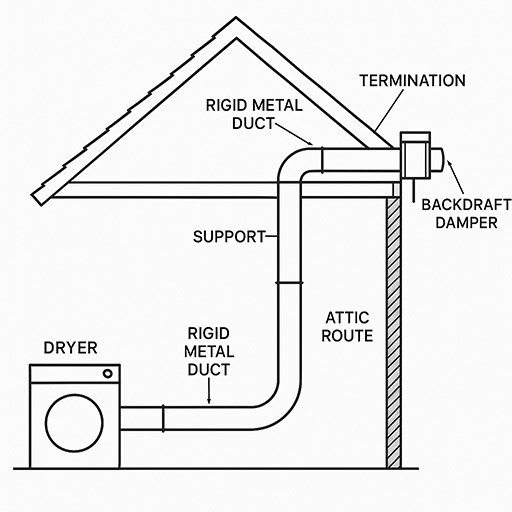
Crawl Space Requirements
Dryer vents may pass through crawl spaces but cannot terminate inside them. Key requirements include:
Crawl Space Installation Standards:
- Rigid metal ducts only—flexible materials prohibited
- Fasteners must not protrude into duct interior
- Use shield plates when routing near framing members
- Terminate outdoors at least 12 inches above grade
- Ensure proper slope to prevent moisture accumulation
Crawl space installations often require additional pest protection measures, which our professional pest guard installation services address comprehensively.
Termination Point Specifications
Dryer vent terminations must meet strict safety and aesthetic standards in Raleigh neighborhoods:
Exterior Wall Terminations:
- Minimum 3 feet from property lines
- At least 12 inches above grade
- 3 feet from windows, doors, and air intake vents
- Proper flashing and weatherproofing required
Roof Terminations:
- Only permitted when wall termination isn’t feasible
- Special flashing and pest guard requirements
- Additional insulation to prevent condensation issues
- Professional installation strongly recommended
4. Multi-Family and Townhouse Code Requirements
Individual Exhaust Systems Mandatory
For townhouses and multi-family properties in Raleigh, each unit must have its own dedicated exhaust system:
NCRC Requirements for Multi-Family Units:
- No shared duct systems between units (NCRC R302.11)
- Fire-rated UL-listed firestop systems required through rated assemblies (NCMC 607.6.2)
- Individual termination points for each unit
- Separate maintenance access for each system
This setup prevents cross-contamination, backdrafts between units, and ensures individual accountability for maintenance and code compliance.
Fire-Rated Assembly Considerations
When dryer vents pass through fire-rated walls or floors:
- Use only UL-listed firestop systems rated for dryer vent penetrations
- Maintain fire rating integrity of the assembly
- Professional installation required for certified compliance
- Regular inspection of firestop systems during maintenance
5. Wake County and Triangle Area Code Variations
Municipal Differences Across the Triangle
While most Triangle communities follow similar base codes, local variations exist:
Wake Forest Dryer Vent Requirements:
- Enhanced wildlife protection measures
- Specific HOA compliance considerations
- Streamlined permit processes for established neighborhoods Our professional dryer vent cleaning Raleigh and Wake Forest area services address these unique requirements.
Cary Municipal Additions:
- Stricter noise ordinances affecting vent placement
- Enhanced aesthetic requirements in historic districts
- Expedited permitting for energy-efficient installations Learn more about our dryer vent cleaning Raleigh services and Cary dryer vent services.
Apex Building Standards:
- Specific requirements for homes near protected watersheds
- Enhanced drainage provisions for vent terminations
- Coordinated inspections with other mechanical systems Discover our dryer vent cleaning Raleigh expertise and Apex area services.
HOA and Neighborhood Covenant Considerations
Many Raleigh-area communities have additional restrictions beyond municipal codes:
- Architectural review requirements for visible vent terminations
- Material and color specifications for exterior components
- Landscaping requirements around ground-level terminations
- Maintenance standards for common areas in condominiums
6. Professional Installation vs. DIY: Code Compliance Implications
When Professional Installation is Required
North Carolina building codes mandate professional installation for:
- New construction dryer vent systems
- Major modifications to existing systems
- Any work requiring electrical connections
- Multi-family dwelling installations
- Commercial property vent systems
Professional installation ensures proper permitting, code compliance, and warranty protection. Our comprehensive professional services include dryer vent cleaning Raleigh code compliance verification and expert installation guidance.
DIY Limitations and Risks
While some maintenance activities are permissible for homeowners, significant limitations exist:
Permitted DIY Activities:
- Lint screen cleaning
- External vent cover cleaning
- Basic troubleshooting
- Scheduling professional inspections
Activities Requiring Professional Service:
- Duct routing modifications
- Termination point changes
- Vent lengthening or shortening
- Pest guard installation and maintenance
7. Fire Safety Codes and Insurance Implications
NFPA Standards and Local Fire Codes
The National Fire Protection Association (NFPA) provides guidelines that supplement building codes:
- NFPA 211: Standards for chimneys, fireplaces, vents, and solid fuel-burning appliances
- Regular inspection requirements for commercial properties
- Specific cleaning frequency recommendations
- Documentation requirements for insurance purposes
Raleigh Fire Department enforces these standards through routine inspections and fire safety education programs.
Insurance Requirements and Premium Considerations
Many insurance carriers now require:
- Annual professional dryer vent inspections
- Documentation of regular cleaning and maintenance
- Code-compliant installation certificates
- Prompt repair of identified deficiencies
Failure to maintain code compliance can void insurance coverage and increase premiums significantly. Our article on ignoring dryer vent cleaning and fire hazards provides detailed information on these risks.
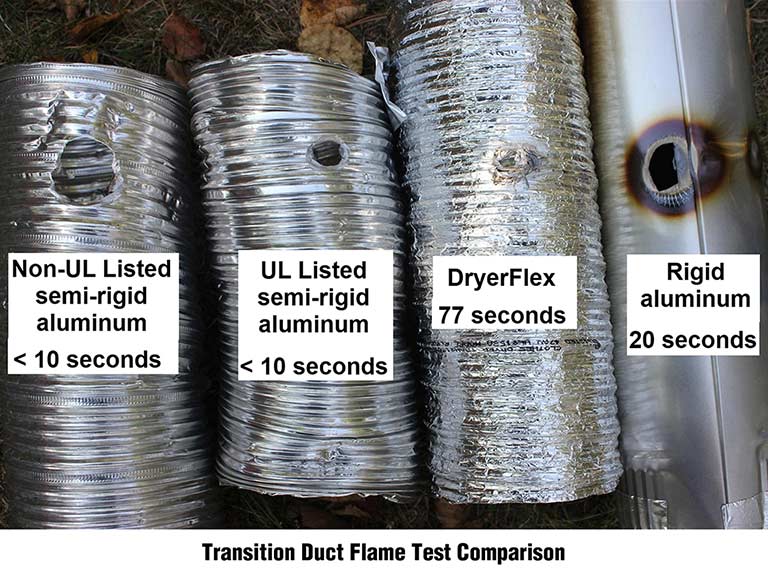
8. Maintenance Code Requirements in Raleigh
Regular Cleaning Obligations
Raleigh building codes require property owners to maintain dryer vents in safe operating condition:
Residential Properties:
- Annual inspection recommended
- Dryer vent cleaning Raleigh frequency based on usage patterns
- Immediate attention to performance issues
- Professional service for complex systems
Commercial Properties:
- Quarterly inspections required
- Monthly cleaning for high-usage facilities
- Detailed maintenance logs
- Emergency response procedures
Large Home Considerations
Raleigh’s many large homes and estates face unique challenges:
- Multiple dryer installations requiring coordination
- Extended duct runs exceeding standard lengths
- Complex routing through multiple floors
- Specialized cleaning equipment requirements
Our large home dryer vent cleaning services address these specific needs while ensuring full code compliance.
9. Pest Guard and Bird Nest Prevention: Code Requirements
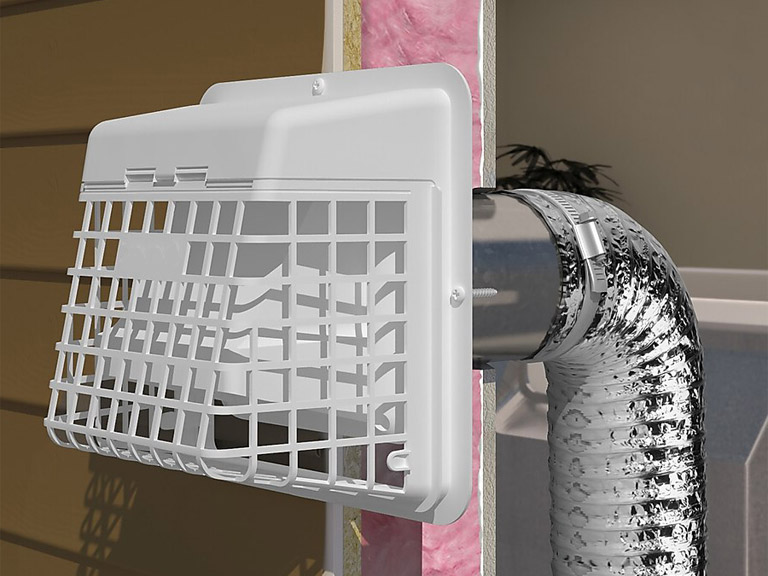
Wildlife Protection Mandates
North Carolina building codes increasingly emphasize wildlife protection, requiring:
- Pest guards on all exterior terminations
- Regular inspection for nesting materials
- Humane removal procedures when nests are found
- Prevention measures to discourage re-nesting
Professional Pest Guard Installation
Proper pest guard installation requires understanding of:
- Local wildlife patterns and behaviors
- Seasonal nesting cycles
- Guard types suitable for different vent configurations
- Maintenance requirements to ensure continued effectiveness
Our professional pest guard installation services include comprehensive bird nest removal and prevention measures, ensuring both code compliance and wildlife conservation.
Pest guards must allow proper airflow while preventing animal intrusion. Common guard types include:
- Hinged guards that open with airflow
- Louvered designs with appropriate spacing
- Screen systems with self-cleaning capabilities
- Magnetic closures for zero-airflow periods
10. Permit Requirements and Inspection Processes
Obtaining Dryer Vent Permits in Raleigh
The permit process for dryer vent work in Raleigh involves:
Application Requirements:
- Detailed installation plans showing routing and materials
- Professional contractor licensing verification
- Fee payment based on project scope
- Estimated completion timeline
Review Process:
- Plan review by building department staff
- Coordination with other mechanical systems
- Approval contingent on code compliance
- Issuance of building permit
Inspection Schedules and Requirements
Raleigh requires multiple inspections for dryer vent installations:
Rough-In Inspection:
- Ductwork routing and support verification
- Material compliance confirmation
- Clearance requirement checks
- Integration with other building systems
Final Inspection:
- Completed installation review
- Termination point assessment
- Airflow testing verification
- Code compliance certification
11. Common Code Violations and How to Avoid Them
Frequent Installation Mistakes in Raleigh
Based on Raleigh building inspection records and our field experience, common violations include:
Material and Installation Violations:
- Terminating vents in attics or crawl spaces instead of outdoors
- Exceeding the 35-foot maximum length without proper calculations
- Using flexible foil ducting through walls or concealed spaces
- Installing screens at termination points (prohibited by NCRC M1502.3.1)
- Improper support systems causing duct sagging or damage
Maintenance-Related Violations:
- Severely clogged vents creating fire hazards
- Blocked termination points from bird nests or pest intrusion
- Damaged or missing backdraft dampers
- Lack of required inspection documentation
These violations not only pose fire risks but can result in costly fines and insurance complications. Our comprehensive article on ignoring dryer vent cleaning and fire hazards details the serious consequences of non-compliance.
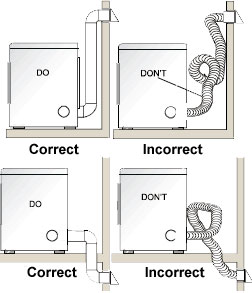
12. Energy Efficiency and Code Compliance
Modern Efficiency Standards
Recent code updates emphasize energy efficiency:
- Insulation requirements for ductwork in unconditioned spaces
- Sealing standards to prevent air leakage
- Timer controls to limit unnecessary operation
- Integration with whole-house ventilation systems
Balancing Efficiency with Safety
Effective dryer vent systems must balance:
- Maximum airflow for efficient drying
- Minimal energy loss through proper insulation
- Easy maintenance access for safety
- Cost-effective installation and operation
13. Working with Raleigh Building Officials
Building Department Resources
The City of Raleigh Building Inspections Department provides:
- Code interpretation assistance
- Pre-application consultations
- Online permit tracking systems
- Educational workshops for contractors and homeowners
Appeal Processes and Variance Requests
When standard code compliance isn’t feasible:
- Variance application procedures
- Alternative compliance methods
- Appeal hearing processes
- Professional consultation requirements
14. Cost Implications of Code Compliance
Budget Planning for Legal Installations
Code-compliant dryer vent installations typically cost:
Basic Wall Termination:
- Materials: $150-$300
- Professional installation: $300-$500
- Permit fees: $50-$100
- Total project cost: $500-$900
Complex Installations:
- Extended routing: Additional $100-$200 per linear foot
- Roof terminations: Additional $200-$400
- Multiple-story runs: Additional $300-$600
- Specialized materials: Variable based on requirements
Long-Term Financial Benefits
Code-compliant installations combined with regular dryer vent cleaning Raleigh maintenance provide:
- Reduced fire insurance premiums
- Improved appliance efficiency and longevity
- Enhanced property values
- Avoided violation penalties and costly repairs
15. Professional Dryer Vent Cleaning Raleigh: Your Code Compliance Partner
Preparing for Code Evolution
Homeowners should consider working with experienced dryer vent cleaning Raleigh professionals who stay current with:
- Future-proofing installations with quality materials
- Documenting current system configurations
- Staying informed about code updates
- Planning preventive maintenance schedules
16. Conclusion: Ensuring Safe, Legal Dryer Vent Operations in Raleigh
Understanding and complying with dryer vent codes in Raleigh, NC, protects your family, property, and investment while ensuring efficient appliance operation. From initial installation through ongoing maintenance, dryer vent cleaning Raleigh professionals ensure full compliance with local, state, and federal requirements.
At DuctNClean, we specialize in comprehensive dryer vent cleaning services throughout the Triangle area. Our experienced dryer vent cleaning Raleigh team understands the unique requirements of Raleigh, Wake Forest, Cary, and Apex properties, ensuring every installation and maintenance service meets or exceeds code requirements.
Don’t risk the safety of your family or the legal compliance of your property. Contact our dryer vent cleaning Raleigh team today for professional services that prioritize safety, efficiency, and legal compliance. Whether you need routine cleaning, code compliance verification, or complete system installation, we’re here to help you navigate the complex world of dryer vent regulations in North Carolina.
Remember, proper dryer vent maintenance isn’t just about following rules—it’s about protecting what matters most. Stay compliant, stay safe, and trust the professionals at Duct N Clean for all your dryer vent needs in the greater Raleigh area.
Dryer Vent Code FAQ for Raleigh Homeowners
1. What is the maximum dryer vent length allowed in Raleigh, NC?
North Carolina building code (NCRC M1502.4.5.1) limits dryer vent duct length to 35 feet, with reductions for elbows—5 feet per 90° bend and 2.5 feet per 45° bend. Longer runs require manufacturer documentation and labeled ducting.
2. Can you run a dryer vent through an attic or crawl space?
Yes, but both routes must follow strict code:
- Attics: Rigid metal duct only, supported every 12 feet, sloped toward termination.
- Crawl spaces: Ducts must not terminate inside; must exit to the exterior 12" above grade.
3. Is foil or plastic dryer vent duct allowed in Raleigh?
No. Flexible foil and plastic ducts are prohibited in wall cavities and concealed spaces per NCRC M1502.4.3. Only rigid or UL-listed transition ducts (max 8 ft) are allowed at the dryer connection point.
4. What are the rules for dryer vent termination in Raleigh?
Termination must be:
- Outdoors only
- At least 12 inches above grade
- 3 feet from windows, doors, or vents
- No screens — backdraft damper required
5. Are pest guards required on dryer vents in Wake County?
Yes. Pest guards are recommended but must not restrict airflow. See our pest guard installation service for Raleigh code-compliant solutions.
6. Do I need a permit to install or modify a dryer vent in Raleigh?
Yes, Raleigh requires permits for new dryer vent installations or major rerouting. This ensures safety, code compliance, and insurance validity.
7. How often should dryer vents be cleaned in Raleigh homes?
- Single-family homes: every 6–12 months
- Homes with pets or large families: every 6 months
- Commercial / multi-dryer setups: quarterly
8. Are there special dryer vent rules for townhouses or condos in Raleigh?
Yes. Each unit must have a dedicated exhaust system and use UL fire-rated assemblies if passing through walls or floors. Read more here.
9. Can clogged vents affect insurance coverage?
Yes. Insurers may deny claims if fire results from a neglected or non-compliant dryer vent. Regular inspections and cleaning protect your safety—and your policy.
10. What does DuctNClean offer to ensure code compliance?
We offer:
- Photo-documented dryer vent inspections
- Code-compliant rerouting & cleaning
- UL-rated pest guard installations
- Expert compliance with Raleigh & Wake County regulations



